
Acta Bioethica
Scope & Guideline
Bridging Cultures through Ethical Inquiry in Health
Introduction
Aims and Scopes
- Interdisciplinary Bioethics Research:
The journal emphasizes research that integrates perspectives from various disciplines including philosophy, medicine, sociology, and law to address contemporary bioethical challenges. - Global Health Ethics:
Acta Bioethica consistently covers issues related to global health, such as equity in healthcare access, the ethical implications of health policies, and the experiences of marginalized populations in health systems. - Humanization in Healthcare:
A core area of focus is the humanization of healthcare practices, emphasizing the importance of dignity, empathy, and ethical treatment in patient care. - Legal and Ethical Analysis:
The journal explores the intersection of law and bioethics, analyzing legal frameworks that govern healthcare practices and patient rights. - Emerging Medical Technologies:
Research examining the ethical implications of new medical technologies, including artificial intelligence, genetic editing, and telemedicine, is a significant area of interest. - Cultural and Intercultural Ethics:
Acta Bioethica promotes discussions on cultural differences in ethical perspectives, especially in relation to health practices and policies in diverse societies.
Trending and Emerging
- Ethics of Digital Health and Telemedicine:
Recent publications indicate a growing interest in the ethical implications of telemedicine and digital health technologies, particularly in light of the COVID-19 pandemic and the shift towards remote healthcare delivery. - Bioethics in the Context of Global Crises:
The journal is increasingly addressing bioethical challenges arising from global health crises, such as pandemics, emphasizing the need for ethical responses to urgent public health issues. - Social Justice and Health Equity:
There is a notable trend towards exploring themes of social justice and health equity, particularly regarding access to care for vulnerable populations and the ethical responsibilities of healthcare systems. - Neuroethics and Mental Health:
Emerging discussions around neuroethics, including ethical considerations in mental health treatment and the implications of neuroscience on personal identity and agency, are gaining traction. - Environmental Ethics and Health:
The intersection of environmental issues and public health ethics is becoming a prominent theme, highlighting the ethical considerations of health impacts from environmental degradation and climate change.
Declining or Waning
- Traditional Medical Ethics:
Discussions rooted in classical medical ethics principles, such as autonomy and beneficence, seem to be less frequently addressed, possibly overshadowed by more contemporary issues involving technology and cultural contexts. - Historical Perspectives in Bioethics:
There appears to be a waning interest in historical analyses of bioethics, as current research focuses more on contemporary issues and practical applications rather than retrospective evaluations. - Generalized Ethical Frameworks:
Papers that propose broad ethical frameworks without specific contextual applications are becoming less common, indicating a move towards more nuanced and context-specific ethical analyses.
Similar Journals
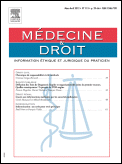
Medecine & Droit
Transforming Medical Practice Through Legal PerspectivesMedecine & Droit, an esteemed journal published by ELSEVIER MASSON, CORP OFF, serves as a vital resource for the intersection of law and medicine. Since its inception in 1995, this journal has facilitated scholarly discourse by publishing innovative research, case studies, and reviews that explore the complexities of legal frameworks impacting medical practice and public health. Although currently classified in the fourth quartile within both the Law and Medicine (miscellaneous) categories for 2023, its contributions are important for legal professionals and healthcare providers seeking to navigate the evolving landscape of medical laws. With an ISSN of 1246-7391 and E-ISSN 1873-6475, it provides essential insights and stimulates interdisciplinary collaboration within academia. Authors and researchers are encouraged to contribute and engage with critical topics shaping the future of medicine and law through this essential publication.
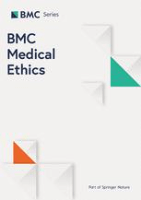
BMC Medical Ethics
Fostering collaboration on critical healthcare issues.BMC Medical Ethics is a leading open-access journal dedicated to the critical exploration and dissemination of knowledge surrounding ethical issues in healthcare and medicine. Published by BMC, and headquartered in the United Kingdom, this journal has become a cornerstone in the field since its inception in 2000, with a remarkable focus on health policy, nursing ethics, and the complex legal aspects intertwining with healthcare practices. With an impressive Q1 ranking across multiple categories, including Health Policy and Health (Social Science), it ranks among the top journals globally—particularly notable with its Scopus rankings reflecting a strong 85th percentile in Nursing and an 81st percentile in Social Sciences. As an open-access publication, BMC Medical Ethics ensures that research findings are readily accessible, fostering a collaborative environment for researchers, practitioners, and students alike. The journal's commitment to ethical discourse not only advances academic inquiry but also shapes the practices and policies that govern healthcare delivery; thus, making it an invaluable resource for those engaged in the advancement of medical ethics.
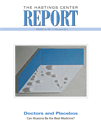
HASTINGS CENTER REPORT
Exploring the intersection of ethics and medicine.The HASTINGS CENTER REPORT, published by WILEY, is a leading journal in the fields of bioethics, health policy, and the philosophical underpinnings of healthcare. Established in 1971, this influential publication provides a critical platform for the discussion of ethical issues in health, medicine, and biotechnology, highlighting the intersection between ethical theory and practical health challenges. The journal achieves remarkable academic stature, achieving Q1 rankings in both Issues, Ethics and Legal Aspects and Philosophy, alongside Q2 standings in Health Policy and Health (social science) categories, reflecting its broad interdisciplinary impact. With its wide readership and rigorous peer-review process, the HASTINGS CENTER REPORT serves as an essential resource for researchers, practitioners, and students dedicated to advancing ethical perspectives in health-related discourse. While the journal operates under traditional access options, its contributions resonate deeply within the academic community, fostering informed dialogue on pressing ethical dilemmas and policy considerations in a rapidly evolving healthcare landscape.

International Journal of Chinese & Comparative Philosophy of Medicine
Unveiling Insights from Chinese and Comparative Medical PracticesThe International Journal of Chinese & Comparative Philosophy of Medicine, published by GLOBAL SCHOLARLY PUBLICATIONS, is a pivotal scholarly platform dedicated to advancing the discourse around traditional Chinese medicine and comparative philosophies in healthcare. With the ISSN 1386-6354, this journal provides a rich repository of peer-reviewed articles that explore integrative approaches to medicine, addressing both historical context and contemporary applications. Although specific metrics such as impact factor are currently unavailable, it aspires to foster interdisciplinary dialogue among researchers, professionals, and students by encouraging innovative thinking and comparative analysis within the realm of medical philosophy. While currently operating under non-open access guidelines, the journal remains committed to disseminating knowledge that bridges diverse medical practices, making it an invaluable resource for those engaged in the study and application of philosophical medicine.

BioLaw Journal-Rivista di Biodiritto
Advancing Ethical Discourse in BiolawBioLaw Journal-Rivista di Biodiritto, published by UNIV TRENTO, FAC LAW, stands as a vital interdisciplinary platform in the domains of biolaw, biotechnology, and health policy. With an ISSN of 2284-4503 and a burgeoning reputation, this journal encourages critical discussions surrounding the ethical, legal, and social implications of biotechnological advancements from 2014 to 2024. Ranked Q3 in both Biochemistry and Biotechnology, alongside Q2 rankings in Law and Philosophy, it reflects a growing body of scholarship in these experimental fields. Although currently categorized with varying percentile ranks in the Scopus database, it underlines the journal's commitment to nurturing innovative research and interdisciplinary dialogue. The journal promotes open access principles, although the specific access options should be verified for each article. It serves as an indispensable resource for researchers, professionals, and students engaged in the evolving intersection of law and biotechnology, making it a key player in shaping future discourses in bioethics and policy.
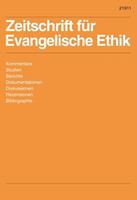
ZEITSCHRIFT FUR EVANGELISCHE ETHIK
Advancing Discourse in Religious StudiesZEITSCHRIFT FUR EVANGELISCHE ETHIK, published by WALTER DE GRUYTER GMBH, is a leading journal in the field of Religious Studies, noted for its critical examination of evangelical ethics and theological perspectives. With an ISSN of 0044-2674 and E-ISSN of 2197-912X, this journal serves as a pivotal platform for scholars seeking to explore contemporary issues through a rigorous ethical lens. Based in Germany, it engages readers with a rich tapestry of interdisciplinary insights, contributing significantly to ongoing discussions within the realm of religious ethics. The journal enjoys a commendable position in the Scopus rankings, placed in the Q3 quartile and ranking #476 out of 644 in its category, reflecting its dedication to quality scholarship. Spanning over two decades, with converged years from 2002 to 2024, it fosters valuable dialogues between researchers, professionals, and students alike. Although not Open Access, the journal's subscription options ensure accessibility to essential scholarly works that can impact both academic and practical applications in religious thought.
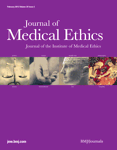
JOURNAL OF MEDICAL ETHICS
Championing Ethical Standards in MedicineJOURNAL OF MEDICAL ETHICS, published by the esteemed BMJ PUBLISHING GROUP, is a leading journal that has been pivotal in advancing the discourse on ethical issues in healthcare since its inception in 1975. This UK-based journal, with an ISSN of 0306-6800 and an E-ISSN of 1473-4257, is well-regarded for its high-quality, peer-reviewed articles that delve into the complex moral dimensions surrounding medical practices, health policies, and social sciences. With a commendable impact, JOURNAL OF MEDICAL ETHICS has achieved Q1 quartile rankings across multiple categories, including Arts and Humanities and Health Policy in 2023, reflecting its significant influence and relevance in the field—ranked #23 of 552 in Arts and Humanities (Miscellaneous) with a 95th percentile, and #26 in Health Policy with a 91st percentile. Researchers, professionals, and students alike can benefit from the journal's commitment to fostering a deeper understanding of ethical considerations vital to the medical community, although it currently does not offer open access options. The journal's comprehensive examination of issues, ethics, and legal aspects continues to make it an essential resource for those dedicated to shaping the ethical landscape of healthcare.
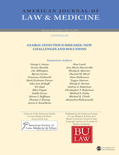
AMERICAN JOURNAL OF LAW & MEDICINE
Bridging Law and Medicine for a Healthier TomorrowAMERICAN JOURNAL OF LAW & MEDICINE is a prestigious interdisciplinary journal published by Cambridge University Press that bridges the critical intersection of legal and medical scholarship. Since its inception in 1975, this journal has fostered scholarly dialogue surrounding complex legal issues affecting health care and medical ethics, significantly contributing to the fields of law and the social sciences. With its current impact factor highlights showcasing a Q2 ranking in Law and Q3 in Health (Social Science), along with a solid readership base, the journal appeals to researchers, legal professionals, and students alike, offering a platform for impactful research and case studies. Although it does not currently provide Open Access options, the journal continues to prioritize rigorous peer-reviewed content, ensuring that essential discussions on law and medicine remain accessible to its readership. By engaging with contemporary legal and medical issues, the AMERICAN JOURNAL OF LAW & MEDICINE plays a vital role in advancing knowledge and shaping practices within these dynamic fields.
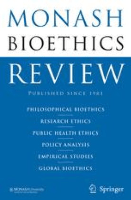
Monash Bioethics Review
Exploring Ethical Frontiers in Health and SocietyMonash Bioethics Review, published by SPRINGER HEIDELBERG, is a leading journal in the interdisciplinary realm of bioethics, dedicated to exploring critical issues at the intersection of health policy, philosophy, and the social sciences. With an impressive impact factor placing it in Q1 in Philosophy and notable rankings across disciplines, including Q3 in Health Policy and Medicine, it serves as an essential platform for researchers, professionals, and students alike. This journal not only aims to foster robust discourse on ethical dilemmas but also seeks to contribute to policymaking through rigorous analysis and research. Covering articles from its inception in 1994 to the present, Monash Bioethics Review remains committed to addressing contemporary ethical challenges in medicine and society, making it a vital resource for those keen on navigating the complexities of bioethical thought.
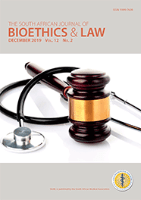
South African Journal of Bioethics and Law
Fostering insights into the ethical and legal challenges in health.South African Journal of Bioethics and Law, published by HEALTH & MEDICAL PUBLISHING GROUP, stands as a vital academic platform for discussions at the intersection of bioethics and legal studies. With an ISSN of 1999-7639, this journal has embraced an Open Access model since 2008, ensuring global accessibility for researchers, practitioners, and students alike. Based in South Africa, the journal operates from PRIVATE BAG X1, PINELANDS, CAPE TOWN 7430, and features diverse articles that span a multitude of pertinent topics across health professions, law, and public health. It proudly holds a Q3 ranking in Health Professions and Law sectors, affirming its status within the scholarly community. Notably, for the year 2023, it has achieved impressive placements in Scopus ranks, reinforcing its commitment to disseminating high-quality research and fostering dialogues that influence policy and practice in these critical domains. Researchers exploring the intricate ethical and legal dimensions of healthcare will find this journal an indispensable resource.